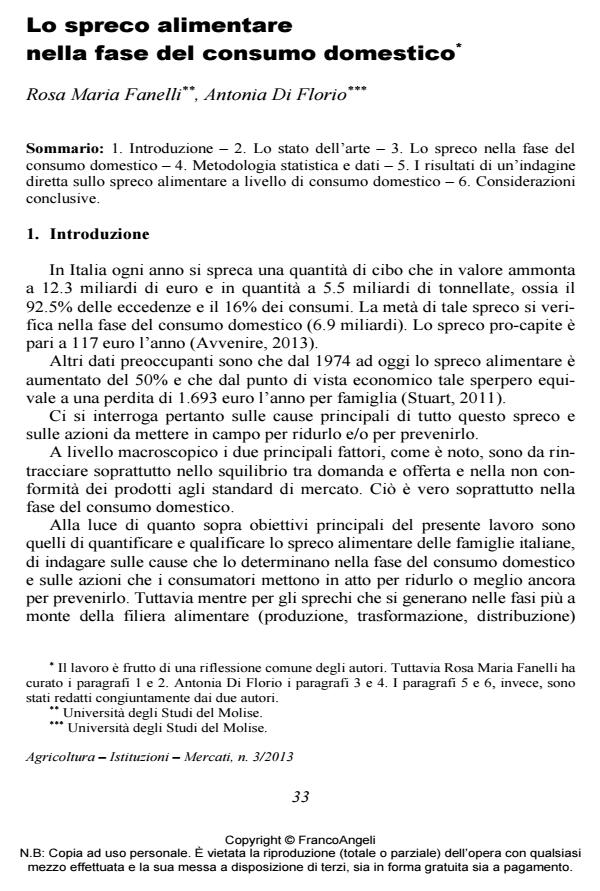Food waste in the phase of domestic consumption
Journal title AGRICOLTURA ISTITUZIONI MERCATI
Author/s Rosa Maria Fanelli
Publishing Year 2015 Issue 2013/3 Language Italian
Pages 18 P. 33-50 File size 91 KB
DOI 10.3280/AIM2013-003003
DOI is like a bar code for intellectual property: to have more infomation
click here
Below, you can see the article first page
If you want to buy this article in PDF format, you can do it, following the instructions to buy download credits

FrancoAngeli is member of Publishers International Linking Association, Inc (PILA), a not-for-profit association which run the CrossRef service enabling links to and from online scholarly content.
This work is part of a research field still little explored both nationally and internationally and which are used in different theoretical approaches and methodologies for quantitative analysis of the dynamics of food waste. Most of the research, globally, it focuses on the formation of waste in the stages of production and distribution. In such links in the food chain, as it is known, food waste seem inevitable because most of them comes from an erroneous inventory management, from production surpluses, by damaged or deformed. Few studies were concerned, however, an analysis of food waste in the phase of domestic consumption. Therefore, this paper aims to fill this deficiency by providing the results of a survey, carried out at a representative sample of the population, to quantify, qualify and identify the causes of food waste as well as actions that consumers put in place to reduce or better even to prevent it. The same survey is conducted on a representative sample of 500 individuals, of which 68.4 % residing in Molise. Such individuals have self - selected by filling out the questionnaire developed using the Google Drive. The questionnaire was launched in April 2014 and remained on-line until June 2014. The same has been spread through the social network "Facebook". The 45 information relating to the characteristics of the individual respondents, the composition of the household, to the habits and attitudes of expenditure and food, guidelines and behaviors to reduce or prevent food waste in the phase of domestic consumption, thus collected are been developed with the use of the software R. Data analysis was conducted in two phases: an analysis of simple correspondences and a cluster analysis. The first allowed to identify why, how and how much is wasted, the second group of respondents into three groups "homogeneous" inside them and uneven between them.
Keywords: Food waste, household consumption, consumer behavior.
- Barilla Position Paper (2012), Lo spreco alimentare: cause, impatti e proposte, www.barillacfn.com/wp-content/PP_PDF_Spreco_Alimentare.pdf.
- Fao (2011), Global Food Losses and Food Waste, Extent, Couses and Prevention.
- Gaiani S. (2013), Lo spreco alimentare domestic in Italia: stime, cause ed impatti, Tesi di laurea, Alma Mater Studiorum – Università di Bologna.
- Hamilton C., Dennis R., Baker D. (2005), Wasteful consumption in Australia, Discussion Paper, Number 77, The Australia Institute, Australia.
- Lyndhurst B. (2007), Food behaviour consumer research-findings from quantitative survey, WRAP, Briefing Paper, UK. Ondersteijn C.J.M., Wijnands J.H.M., van Kooten O., (2006), Quantifying the agri-food supply chain, Wageningen UR Frontis Series 15, Wur, Wageningen.
- Segrè A., Falasconi L. (2002), Abbondanza e scarsità nelle economie sviluppate. Per una valorizzazione sostenibile dei prodotti alimentari invenduti, Franco Angeli, Milano.
- Segrè A., Falasconi L. (2011), Il libro nero dello spreco: il cibo, Edizione Ambiente, Milano.
- Stuart T. (2011), Waste – Uncovering the global food scandal, Penguin Books, London.
- Wenlock R.W., Buss D.H. (1977), «Wastage of edible food in the home: a pleliminary study», J. Hum Nutr., 31 (6).
- Zani S., Cerioli A. (2007), Analisi dei dati e datamining per le decisioni aziendali, Giuffrè, Milano.
- How to implement new educational campaigns against food waste: An analysis of best practices in European Countries Rosa Maria Fanelli, Angela Di Nocera, in ECONOMIA AGRO-ALIMENTARE 2/2017 pp.223
DOI: 10.3280/ECAG2017-002003
Rosa Maria Fanelli, Lo spreco alimentare nella fase del consumo domestico in "AGRICOLTURA ISTITUZIONI MERCATI " 3/2013, pp 33-50, DOI: 10.3280/AIM2013-003003